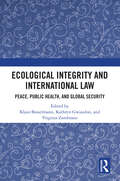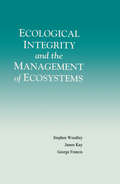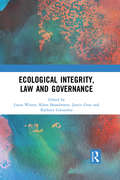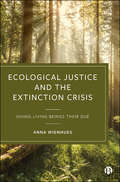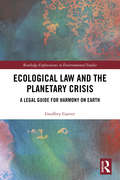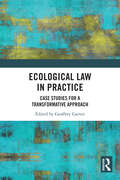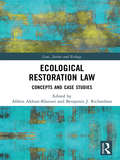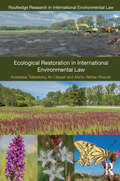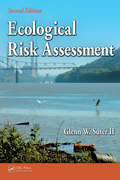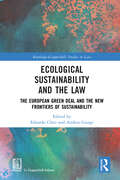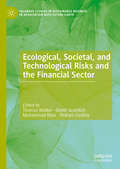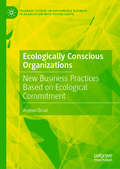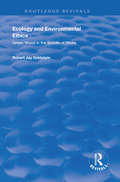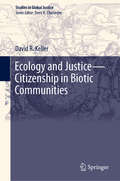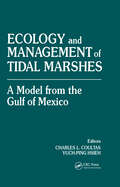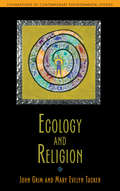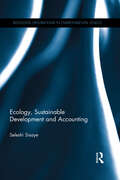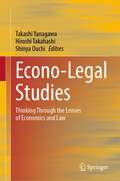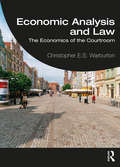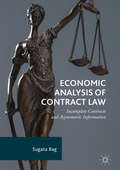- Table View
- List View
Ecological Governance
by Olivia WoolleyEcological degradation has been an object of concern for the international community since the early 1970s, but legal approaches that have been employed to improve the protection of ecosystems have failed to halt this decline. Ecological Governance explores how the law should respond to this rapid global deterioration of ecosystems by examining the foundational scientific and ethical considerations for designing laws that are effective for ecological protection. Based on these analyses, it argues that developed states should prioritise the reduction of the ecological stresses for which they are responsible in decision-making on their future courses. The author also proposes structures for governance and associated legal frameworks that would enable the formulation and implementation of policies for ecological sustainability.
Ecological Integrity and International Law: Peace, Public Health, and Global Security
by Klaus Bosselmann Kathryn Gwiazdon Virginia ZambranoThis book examines how the principle of ecological integrity in international law and governance can help address our current global crises.The principle of ecological integrity points to the basic foundations that must exist for life – all life – not only to exist but also to flourish. Ecological integrity, or well-being, cuts across legal and geopolitical spheres, insofar as it is the decisions within our systems of governance that determine the integrity of our various living systems. This book provides a comprehensive examination of how the principle of ecological integrity can help us respond to our current crises of global conflict and insecurity. Including chapters by both academics and practitioners and by both experienced and emerging authors, the book covers a range of contemporary issues – the climate crisis, war, the pandemic, food, and more – at the intersection of peace, public health, and global security.It will appeal to scholars across a range of fields, including law, sociology, political science, environmental studies, and public health.
Ecological Integrity and the Management of Ecosystems
by James Kay Steven WoodleyToday, efforts are being made to rehabilitate badly degraded ecosystems and protect areas which have important ecological value, such as national parks, critical fish and wildlife habitats, natural communities and endangered species.Since human values are an integral part of the decisions to protect or rehabilitate-the goals and objectives for such actions are often unclear. Concepts of "health," "integrity" and "diversity" express important values associated with management actions but they do not provide clear guidelines for these actions.The criteria developed and applied in this book provide guidelines and serve as a road map to anyone involved in ecosystem management-scientists, land managers and policy makers.
Ecological Integrity in Science and Law: Science, Ethics And The Law (Routledge Research In International Environmental Law Ser.)
by Laura Westra Klaus Bosselmann Matteo FermegliaThis book offers recent insights into some of the burning issues of our times: climate change, exposure to chemicals, refugee issues and the ecological harm that accompanies conflict situations. It brings together a group of pioneering scholars, mostly legal experts but also thinkers from various scientific disciplines, to discuss concerns from around the globe – from Australia and New Zealand, to Canada and the United States, European countries including Germany, Italy, Britain and the Czech Republic, as well as the African continent. Presenting the latest climate and ecology-related case law, as well as analyses of the conceptual issues that underlie international problems, it covers the extinction of species, the basic role of women and Indigenous peoples in protecting the environment, the failure of today’s states to protect the human right to a safe environment and public health, the harm arising from industrial food production, and the problems resulting from a growth-oriented economy. Lastly, the book examines various international legal principles and regulations that have been proposed to defend global ecological rights.
Ecological Integrity, Law and Governance: Science, Ethics And The Law (Routledge Research In International Environmental Law Ser.)
by Laura Westra Janice Gray Klaus Bosselmann Kathryn GwiazdonEcological integrity is concerned with protecting the planet in a holistic way, while respecting ethics and human rights. Over recent years it has been introduced directly and indirectly in several legal regimes, culminating in international law with the 2016 expanded remit of the International Criminal Court, which now includes "environmental disasters". This book celebrates the 25th anniversary of the Global Ecological Integrity Group (GEIG), which includes more than 250 scholars and independent researchers worldwide, from diverse disciplines, including ecology, biology, philosophy, epidemiology, public health, ecological economics, and international law. It reviews the role of ecological integrity across a number of fields through inter- and trans-disciplinary engagement on matters affecting and governing the sustainability of life for both present and future generations. These include, ethics, environmental disasters, crimes against humanity and environmental health, and how such issues can be subject to sound governance and be incorporated into international law. The book also looks forward to new applications of the concept of ecological integrity, such as crimes that result in the exploitation of natural resources and the illegal dispossession of land.
Ecological Jurisprudence: The Law of Nature and the Nature of Law (Contemporary Environmental Law and Policy)
by Alessandro PelizzonThis open access book explores the rise of ecological jurisprudence, a transformative legal theory that challenges traditional legal boundaries. Drawing on over 15 years of research and teaching, the book offers a comprehensive theoretical exploration of this new approach to law, via a comprehensive examination of a wide range of initiatives from around the world, as well as a deep theoretical engagement with the implications of this novel legal theory. Covering a breadth of topics never before brought together with such clear and wide-ranging scope, this book points to the emergence of an ecological jurisprudence not only as a profound transformation of legal norms, but as a radical reimagination of law itself, and serves as a vital resource for scholars and practitioners interested in the future of environmental law Along with Stone’s Do Trees Have Standing? (1972), Cullinan’s Wild Law (2002), and the Ecuadorian Constitution (2008), we can now name Pelizzon’s Ecological Jurisprudence as a key milestone in the field. (Herman F. Greene, JD, DMin, Thomas Berry Scholar-in-Residence, The Earth Law Center) An immense gift to the field and to generations of lawyers to come, Ecological Jurisprudence contains teachings from which one could learn for a lifetime. (Katarina Hovden, University of Copenhagen) Alessandro Pelizzon's Ecological Jurisprudence is deeply-rooted in how the law can best serve the natural world, inspiring future lawyers with the kind of jurisprudence the natural world so urgently needs to exist. (Maria Mercedes Sánchez, Former Coordinator of the United Nations Harmony with Nature Programme) Pelizzon coins the term ‘ecological jurisprudence’ and mobilises it to create deep normative foundations for future environmental law developments. Any serious environmental scholar will have to engage with him because of the breadth and depth of what he achieves in this book. (Professor Afshin Akhtar-Khavari, QUT)
Ecological Justice and the Extinction Crisis: Giving Living Beings their Due
by Anna WienhuesePDF and ePUB available Open Access under CC-BY-NC-ND licence. As the biodiversity crisis deepens, Anna Wienhues sets out radical environmental thinking and action to respond to the threat of mass species extinction. The book conceptualises large-scale injustice endangering non-humans, and signposts new approaches to the conservation of a shared planet. Developing principles of distributive ecological justice, it builds towards a bold vision of just conservation that can inform the work of policy makers and activists. This is a timely, original and compelling investigation into ethics in the natural world during the Anthropocene, and a call for biocentric ecological justice before it is too late.
Ecological Law and the Planetary Crisis: A Legal Guide for Harmony on Earth (Routledge Explorations in Environmental Studies)
by Geoffrey GarverThis book uses a transdisciplinary systems approach to examine how Earth’s human-caused ecological crisis arose and presents a new legal approach for overcoming it. Ecological Law and the Planetary Crisis first examines how the history of humanity’s social metabolism, along with the history of human inventions and ideas, led to the human-Earth dilemma we see today and explains why contemporary law is inadequate for confronting this dilemma. The book goes on to propose ecological law—law that maintains human activity within ecological limits such as planetary boundaries while ensuring social justice and equity—as an essential element of an urgently needed radical pathway of change toward a perpetual, mutually enhancing human-Earth relationship. Finally, it offers a systems-based analytical tool for organizing actions to promote the transition from environmental to ecological law. Increasing the visibility, clarity and development of ecological law, this book will be of great interest to students and scholars of ecological and environmental law and governance.
Ecological Law in Practice: Case Studies for a Transformative Approach
by Edited by Geoffrey GarverThis book presents a series of "ecological law" case studies, designed to illustrate in concrete, real-world ways how ecological law would transform law in a range of diverse contexts.Ecological law is an emerging, and currently mostly theoretical, discipline grounded in the need to shift away from anthropocentric legal systems, which aim to promote economic growth using strong protections of private property regimes and state sovereignty, to ecological approaches, which emphasize ecocentrism, the primacy of ecological limits, and intragenerational, intergenerational, and interspecies fairness and justice. The ecological law case studies presented in this book apply the theoretical principles and concepts of ecological law to diverse real-world situations or activities in several countries and contexts. Taking up a range of examples from Brazil, Canada, Germany, Mexico, Nigeria, the United States, and internationally, the book demonstrates the concrete relevance of ecological law to contemporary sustainability challenges, as it reveals pathways for overcoming real-world challenges in the implementation and public acceptance of ecological law.This book will appeal to researchers, scholars, and policy makers working in the area of environmental law and governance, as well as others with relevant interests in sociolegal studies, human geography, political science, and environmental studies.
Ecological Restoration Law: Concepts and Case Studies (Law, Justice and Ecology)
by Benjamin J. Richardson Afshin Akhtar-KhavariEcological restoration is as essential as sustainable development for the health of the biosphere. Restoration, however, has been a low priority of most countries' environmental laws, which tend to focus narrowly on rehabilitation of small, discrete sites rather than the more ambitious recovery of entire ecosystems and landscapes. Through critical theoretical perspectives and topical case studies, this book's diverse contributors explore a more ambitious agenda for ecological restoration law. Not only do they investigate current laws and other governance mechanisms; they also consider the philosophical and methodological bases for the law to take ecological restoration more seriously. Through exploration of themes relating to time, space, geography, semiotics, social justice, and scientific knowledge, this book offers innovative and critical insights into ecological restoration law.
Ecological Restoration in International Environmental Law (Routledge Research in International Environmental Law)
by Anastasia Telesetsky Afshin Akhtar-Khavari An CliquetHuman activities are depleting ecosystems at an unprecedented rate. In spite of nature conservation efforts worldwide, many ecosystems including those critical for human well-being have been damaged or destroyed. States and citizens need a new vision of how humans can reconnect with the natural environment. With its focus on the long-term holistic recovery of ecosystems, ecological restoration has received increasing attention in the past decade from both scientists and policymakers. Research on the implications of ecological restoration for the law and law for ecological restoration has been largely overlooked. This is the first published book to examine comprehensively the relationship between international environmental law and ecological restoration. While international environmental law (IEL) has developed significantly as a discipline over the past four decades, this book enquires whether IEL can now assist states in making a strategic transition from not just protecting and maintaining the natural environment but also actively restoring it. Arguing that states have international duties to restore, this book offers reflections on the philosophical context of ecological restoration and the legal content of a duty to restore from an international law, European Union law and national law perspective. The book concludes with a discussion of several contemporary themes of interest to both lawyers and ecologists including the role of private actors, protected areas and climate change in ecological restoration.
Ecological Risk Assessment
by Glenn W. Suter IIThe definitive reference in its field, Ecological Risk Assessment, Second Edition details the latest advances in science and practice. In the fourteen years since the publication of the best-selling first edition, ecological risk assessment (ERA) has moved from the margins into the spotlight. It is now commonly applied to the regulation of c
Ecological Sustainability and the Law: The European Green Deal and the New Frontiers of Sustainability (Routledge-Giappichelli Studies in Law)
by Edoardo Chiti Andrea GiorgiThis book explores the emergence of ecological sustainability as a new EU policy and legal objective, distinct and autonomous from sustainable development. It argues that sustainability can no longer be conflated into sustainable development only, but should rather be represented as a plural construction, in which ecological sustainability coexists next to sustainable development. While the latter orientates most of the regulatory measures stemming from the Green Deal, the former is playing an increasingly relevant role in a number of legislative initiatives. The volume considers whether and how the EU legislator is exploiting the new opportunities brought forth by the redefinition of sustainability. To do so, a thematic approach is adopted and the inquiry is organized in five different parts, each devoted to one specific transition triggered by the European Green Deal. Navigating the dynamics of the many transitions occurring in the horizon of European climate neutrality, key chapters shed light on the EU regulatory schemes through which ecological sustainability is in the process of being operationalized and critically discuss their points of strength, weaknesses and underlying tensions. In doing so, they provide an overview of the legal changes occurring in areas of topical interest such as agri-food, energy, digitalization, corporate governance and intellectual property, as well as a number of insights on the relevance of ecological sustainability for the internal dynamism of the European Green Deal. This extensive and innovative appraisal of the field will prove a stimulating read for academics, researchers and advanced students interested in the new ecological law stemming from the Green Deal, the changing features of sustainability and the relevance of the Green Deal as a regulatory project.
Ecological Vulnerability: The Law and Governance of Human–Wildlife Relationships
by Katie WoolastonHumans are responsible for biodiversity loss in many related and sometimes conflicting ways. Human-wildlife conflict, commonly defined as any negative interaction between people and wildlife, is a primary contributor to wildlife extinction and a manifestation of the destructive relationship that people have with wildlife. The author presents this 'wicked' problem in a social and legal context and demonstrates that legal institutions structurally deny human-wildlife conflict, while exacerbating conflict, promoting values consistent with individual autonomy, and ignoring the interconnected vulnerabilities shared by human and non-human species alike. It is the use of international and state law that sheds light on existing conflicts, including dingo conflict on K'Gari-Fraser Island in Australia, elephant conflict in Northern Botswana, and the global wildlife trade contributing to COVID-19. This book presents a critical analysis of human-wildlife conflict and its governance, to guide lawyers, scientists and conservations alike in the transformation of the management of human-wildlife conflict.
Ecological, Societal, and Technological Risks and the Financial Sector (Palgrave Studies in Sustainable Business In Association with Future Earth)
by Thomas Walker Dieter Gramlich Mohammad Bitar Pedram FardniaToday’s financial sector faces multiple challenges stemming from ecological, societal, and technological risks such as climate change, political extremism, and cyber-attacks. However, these non-traditional risks are yet to be fully identified and measured, in order to ensure their successful management. This edited collection sheds light on the topic by examining the unique measurement and modelling challenges associated with each of these risks, and their interaction with finance. Offering a comprehensive analysis of non-traditional finance risks, the authors provide the basis for developing appropriate risk management techniques. With new approaches to protect against emerging threats to the financial sector, this edited collection will appeal to academics researching sustainability, development finance, and risk management, as well as policy-makers and practitioners within the banking sector.
Ecologically Conscious Organizations: New Business Practices Based on Ecological Commitment (Palgrave Studies in Sustainable Business In Association with Future Earth)
by András ÓcsaiThis book investigates the value orientation of ecologically conscious business. It analyzes, in a systematic and comparative way, the value commitments and business models of exemplary ecologically conscious businesses from around the world.Ecological consciousness is gaining importance in modern business thinking, as the effects of the Anthropocene – acidification of oceans, diminishing potable water, climate change, and decreasing biodiversity – are becoming more evident. Surviving this ecological crisis requires a radical inner transformation of humanity, and an ecological transformation of business and the economy.This book is valuable reading for masters and Ph.D. students, as well as academics, business practitioners, and policymakers who are working in the field of business ethics, business and the natural environment, business and society, sustainability, and corporate social responsibility. It also serves as general reading for reflective practitioners who are interested in progressive, ecologically conscious businesses, ethical business functioning, and business model innovation.
Ecology and Environmental Ethics: Green Wood in the Bundle of Sticks (Routledge Revivals)
by Robert Jay GoldsteinOriginally published in 2004. Examining the successes and failures of three decades of environmental law, this absorbing book reconsiders some of the policies devised to remedy centuries of abuse of the planet. It acknowledges the advances made using technological standards to effect pollution control as well as rudimentary systems that regulate use of land at the local level. However, as the author observes, these systems have limitations in solving vexing problems such as sprawl and non-point source pollution, as the cost of their use can easily outweigh the benefits. He suggests a system, termed 'Green Wood in the Bundle of Sticks', that provides the necessary theoretical and historical bases to bridge the gap between the potentials of each system. Using objective criteria based on science, this system is tied to a land ownership system that also takes into account societal concerns at a broader level.
Ecology and Justice—Citizenship in Biotic Communities (Studies in Global Justice #19)
by David R. KellerThis is the first book to outline a basic philosophy of ecology using the standard categories of academic philosophy: metaphysics, axiology, epistemology, aesthetics, ethics, and political philosophy. The problems of global justice invariably involve ecological factors. Yet the science of ecology is itself imbued with philosophical questions. Therefore, studies in ecological justice, the sub-discipline of global justice that relates to the interaction of human and natural systems, should be preceded by the study of the philosophy of ecology. This book enables the reader to access a philosophy of ecology and shows how this philosophy is inherently normative and provides tools for securing ecological justice. The moral philosophy of ecology directly addresses the root cause of ecological and environmental injustice: the violation of fundamental human rights caused by the inequitable distribution of the benefits (economies) and costs (diseconomies) of industrialism. Philosophy of ecology thus has implications for human rights, pollution, poverty, unequal access to resources, sustainability, consumerism, land use, biodiversity, industrialization, energy policy, and other issues of social and global justice. This book offers an historical and interdisciplinary exegesis. The analysis is situated in the context of the Western intellectual tradition, and includes great thinkers in the history of ecological thinking in the West from the natural sciences, social sciences and humanities. Keller asks the big questions and surveys answers with remarkable detail. Here is an insightful analysis of contemporary, classical, and ancient thought, alike in the ecological sciences, the humanities, and economics, the roots and fruits of our concepts of nature and of being in the world. Keller is unexcelled in bridging the is/ought gap, bridging nature and culture, and in celebrating the richness of life, its pattern, process, and creativity on our wonderland Earth. Holmes Rolston, III University Distinguished Professor, Colorado State UniversityAuthor of A New Environmental Ethics: The Next Millennium for Life on Earth (2012) Mentored by renowned ecologist Frank Golley and renowned philosopher Frederick Ferré, David Keller is well prepared to provide a deep history and a sweeping synthesis of the "idea of ecology"—including the metaphysical, epistemological, and ethical aspects of that idea, as well as the scientific. J. Baird Callicott University Distinguished Research Professor, University of North TexasAuthor of Thinking Like a Planet: The Land Ethic and the Earth Ethic (2013)
Ecology and Management of Tidal MarshesA Model from the Gulf of Mexico
by Charles L. CoultasThis is a major compendium of the existing knowledge of the ecology and management of tidal marshes by some of the leading experts in the field. The major theme of the book is the interconnectedness of the marsh, plants, marine organisms, soils and geology, energy and money flow, and legal and management effects on the system.Emphasis is placed throughout on the fact that nature has provided a free service that can either be maintained and enhanced by man or destroyed and forever lost. At a time of declining fisheries, this book points the way to management strategies that are needed to effect improvement.
Ecology and Religion (Foundations Contemporary Environmental)
by Mary Evelyn Tucker John GrimFrom the Psalms in the Bible to the sacred rivers in Hinduism, the natural world has been integral to the world's religions. John Grim and Mary Evelyn Tucker contend that today's growing environmental challenges make the relationship ever more vital. This primer explores the history of religious traditions and the environment, illustrating how religious teachings and practices both promoted and at times subverted sustainability. Subsequent chapters examine the emergence of religious ecology, as views of nature changed in religious traditions and the ecological sciences. Yet the authors argue that religion and ecology are not the province of institutions or disciplines alone. They describe four fundamental aspects of religious life: orienting, grounding, nurturing, and transforming. Readers then see how these phenomena are experienced in a Native American religion, Orthodox Christianity, Confucianism, and Hinduism. Ultimately, Grim and Tucker argue that the engagement of religious communities is necessary if humanity is to sustain itself and the planet. Students of environmental ethics, theology and ecology, world religions, and environmental studies will receive a solid grounding in the burgeoning field of religious ecology.
Ecology, Sustainable Development and Accounting (Routledge Explorations in Environmental Studies)
by Seleshi SisayeAccounting literature has viewed sustainability in terms of social, economic and environmental performances. There have been concerns that the relationship between sustainability, accounting and organizational performance cannot be explained unless we can deduce patterns of administrative behaviour that chronicle management practices. Ecology, Sustainable Development and Accounting argues that, despite the broader social and economic development dimensions of sustainability and the limitations of its extension to corporate and organizational behaviour; an ecological framework is capable of providing the overall societal and community chronologies that describe corporate sustainable operations. Drawing examples from international development and federal government organizations, this book documents the link between ecology, corporate sustainable development, and sustainability accounting and reporting. It draws together the literature from several disciplines to elaborate the contribution of the ecological approach to sustainable development in the accounting literature. This book will be of particular interest to students, academics and practitioners in the areas of environmental studies, ecological economics, sustainable development studies, and social and environmental accounting. The sociological and anthropological perspectives make this book the first of its kind to apply the population ecology of sociology to both the sustainability and accounting literature.
Econo-Legal Studies: Thinking Through the Lenses of Economics and Law
by Shinya Ouchi Hiroshi Takahashi Takashi YanagawaThis book is the first attempt to establish a collaborative and interdisciplinary field of economics and legal studies. It is designed to help readers – advanced undergraduate and graduate students, but also fellow scholars who are interested in interdisciplinarity – to think through the dual lenses of economics and law. “Econo-Legal Studies,” as we call it, is an economics that pays greater attention to the perspective and heritage of legal studies, and at the same time legal studies that fully utilize the views and methods of economics – while “law and economics” is just a one-way economic approach to law focusing on the effects of the latter on efficiency. The aim of this book is to encourage readers to think like economists and, at the same time, legal scholars as they analyze complex real-world issues. It presents stimulating discussions on the intersection of law and economics, the differences and unexpected similarities between the two perspectives, and the new insights to be gained when approaching a problem from both angles. For this purpose, the extensive corpus of knowledge produced within the framework of the Econo-Legal Studies interdisciplinary program at Kobe University can be capitalized on. Basic knowledge of both economics and law is also included in this volume, making it an engaging read for beginners in both fields as well.
Economic Analysis and Law: The Economics of the Courtroom
by Christopher E.S. WarburtonA comprehensive presentation of the use of economics in judicial decisions, the book is structured to provide all the foundational concepts that are important for the application of economics to the development and interpretation of statutes that emanate from economic conditions. The diversity of the economic field defines the scope of the book and its relevance to the study of law and rule adjudication. Beyond the positive dimensions of law and economics, the book evaluates the normative aspects of law and economics when laws are imprecise, and markets are inefficient. The ethical scope of transactions and rule adjudication are further considered in the context of professional ethics and the rationale for ethical considerations in the practice of law and economics. It presents a unique analysis of law, finance, and economics, by taking a look at the intricate quantitative requirements that are essential for scientific knowledge in the courtroom and the international dimensions of the practice of law and economics beyond municipal frontiers. It alerts entrepreneurs to risk exposures in the global economy and provides foundational information for readers who are also interested in international law and economics, and the essence and interpretations of international conventions appertaining to money, expropriation, the environment, and investments in international financial markets. This book is a useful reference for both undergraduate and graduate students who are interested in law and economics, forensic economics, corporate white-collar crime, and legal studies. It is also valuable for certificate programs for paralegals who wish to have a basic understanding of economic and financial concepts.
Economic Analysis for Ecosystem-Based Management: Applications to Marine and Coastal Environments
by Robert Johnston Daniel Holland James Sanchirico Deepak JoglekaOcean and coastal management regimes are increasingly subject to competing demands from stakeholders. Regulations must not only address fishing, recreation, and shipping, but also sand and gravel mining, gas pipelines, harbor/port development, offshore wind and tidal energy facilities, liquefied natural gas terminals, offshore aquaculture, and desalinization plants. The growing variety and intensity of ocean and coastal uses increases the call for a more holistic, comprehensive, and coordinated management approach that recognizes the often complex relationships between natural and human systems. For both economist and non-economist audiences, this book describes ways in which economic analysis can be an important tool to inform and improve ecosystem-based management (EBM). Topics include modeling economic impacts, benefit-cost analysis, spatial considerations in EBM, incentives and human behaviors, and accounting for uncertainty in policy analysis. Throughout the book the authors elucidate the different kinds of insights which can be gained from the use of different economic tools. In this rigorous and accessible work, the authors defy the conventional stereotype that economic perspectives necessarily favor the greatest commercial development. Instead, they demonstrate how comprehensive economic analyses consider the full range of potential services offered by marine and coastal ecosystems, including the conservation of biodiversity and creation of recreational opportunities.
Economic Analysis of Contract Law
by Sugata BagThis book examines the main issues arising in economic analysis of contract law with special attention given to the incomplete contracts. It discusses both the main features of contract law as they relate to the problem of economic exchange, and how the relevant legal rules and the institutions can be analysed from an economic perspective. Evaluate the welfare impacts, analyses the effects and the desirability of different breach remedies and examines the optimal incentive structure of party-designed liquidated damages under the different dimensions of informational asymmetry. Overall the book aims to contribute to the legal debate over the adoption of the specific breach remedies when the breach victim's expectation interest is difficult to assess, and to the debate over courts' reluctance to implement large penalties in the event of breach of contracts.

